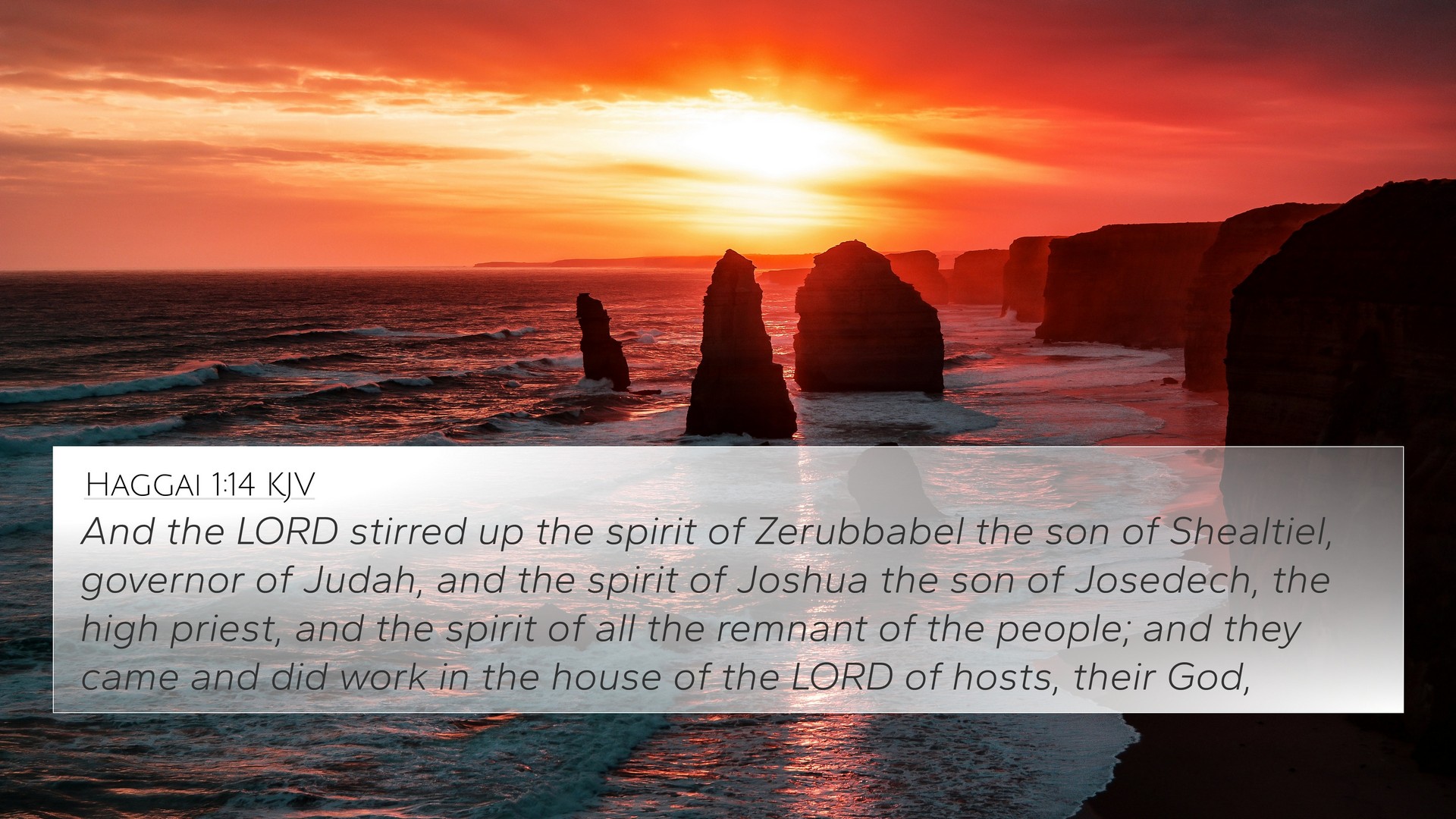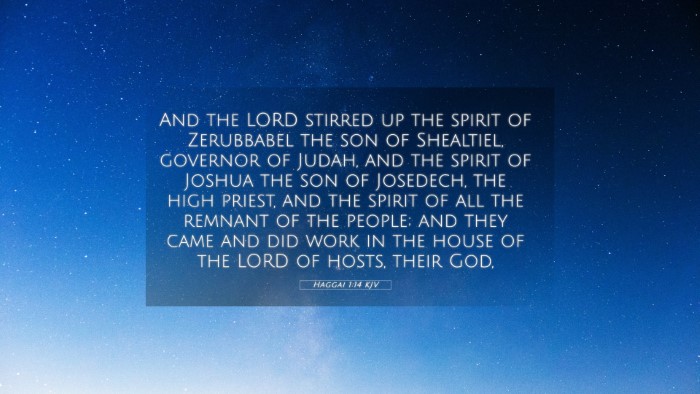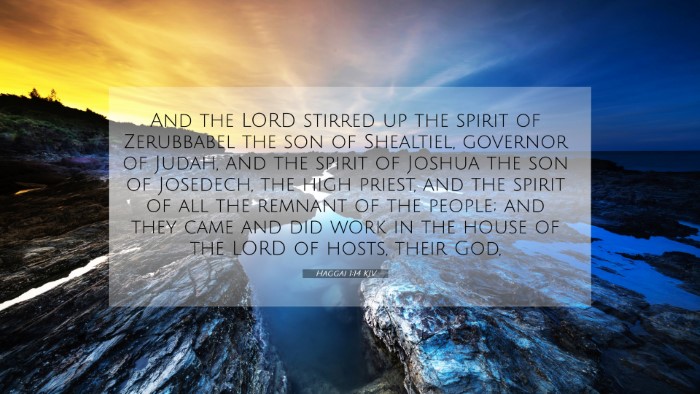Old Testament
Genesis Exodus Leviticus Numbers Deuteronomy Joshua Judges Ruth 1 Samuel 2 Samuel 1 Kings 2 Kings 1 Chronicles 2 Chronicles Ezra Nehemiah Esther Job Psalms Proverbs Ecclesiastes Song of Solomon Isaiah Jeremiah Lamentations Ezekiel Daniel Hosea Joel Amos Obadiah Jonah Micah Nahum Habakkuk Zephaniah Haggai Zechariah MalachiHaggai 1:14 Similar Verses
Haggai 1:14 Cross References
And the LORD stirred up the spirit of Zerubbabel the son of Shealtiel, governor of Judah, and the spirit of Joshua the son of Josedech, the high priest, and the spirit of all the remnant of the people; and they came and did work in the house of the LORD of hosts, their God,
Uncover the Rich Themes and Topics of This Bible Verse
Listed below are the Bible themes associated with Haggai 1:14. We invite you to explore each theme to gain deeper insights into the Scriptures.
Haggai 1:14 Cross Reference Verses
This section features a detailed cross-reference designed to enrich your understanding of the Scriptures. Below, you will find carefully selected verses that echo the themes and teachings related to Haggai 1:14 KJV. Click on any image to explore detailed analyses of related Bible verses and uncover deeper theological insights.

2 Chronicles 36:22 (KJV) »
Now in the first year of Cyrus king of Persia, that the word of the LORD spoken by the mouth of Jeremiah might be accomplished, the LORD stirred up the spirit of Cyrus king of Persia, that he made a proclamation throughout all his kingdom, and put it also in writing, saying,
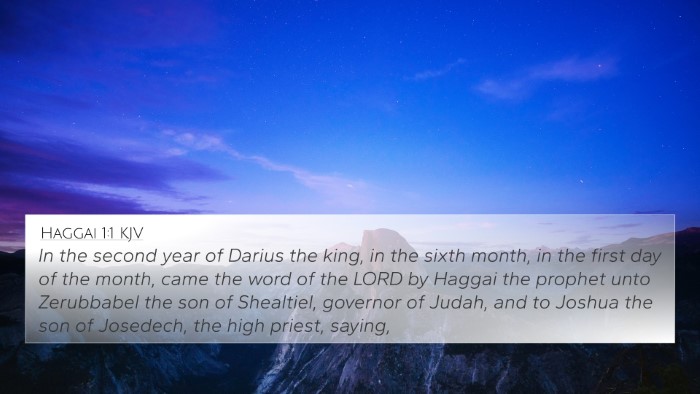
Haggai 1:1 (KJV) »
In the second year of Darius the king, in the sixth month, in the first day of the month, came the word of the LORD by Haggai the prophet unto Zerubbabel the son of Shealtiel, governor of Judah, and to Joshua the son of Josedech, the high priest, saying,
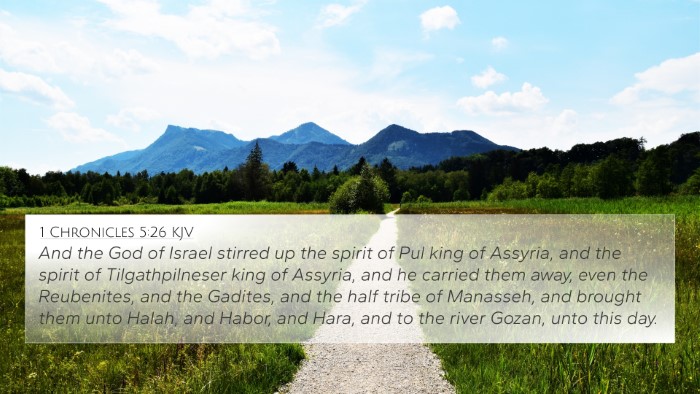
1 Chronicles 5:26 (KJV) »
And the God of Israel stirred up the spirit of Pul king of Assyria, and the spirit of Tilgathpilneser king of Assyria, and he carried them away, even the Reubenites, and the Gadites, and the half tribe of Manasseh, and brought them unto Halah, and Habor, and Hara, and to the river Gozan, unto this day.

Haggai 2:21 (KJV) »
Speak to Zerubbabel, governor of Judah, saying, I will shake the heavens and the earth;
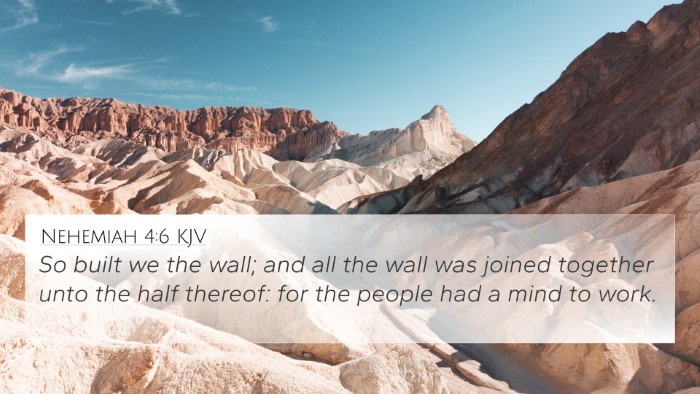
Nehemiah 4:6 (KJV) »
So built we the wall; and all the wall was joined together unto the half thereof: for the people had a mind to work.
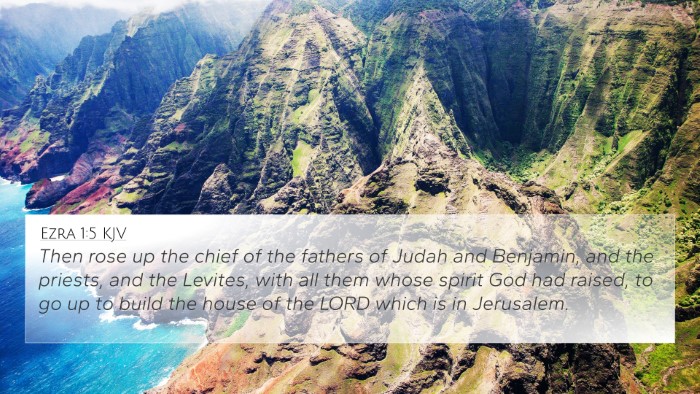
Ezra 1:5 (KJV) »
Then rose up the chief of the fathers of Judah and Benjamin, and the priests, and the Levites, with all them whose spirit God had raised, to go up to build the house of the LORD which is in Jerusalem.
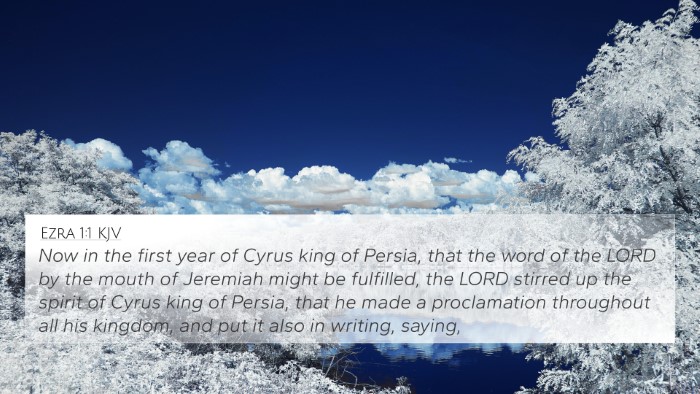
Ezra 1:1 (KJV) »
Now in the first year of Cyrus king of Persia, that the word of the LORD by the mouth of Jeremiah might be fulfilled, the LORD stirred up the spirit of Cyrus king of Persia, that he made a proclamation throughout all his kingdom, and put it also in writing, saying,
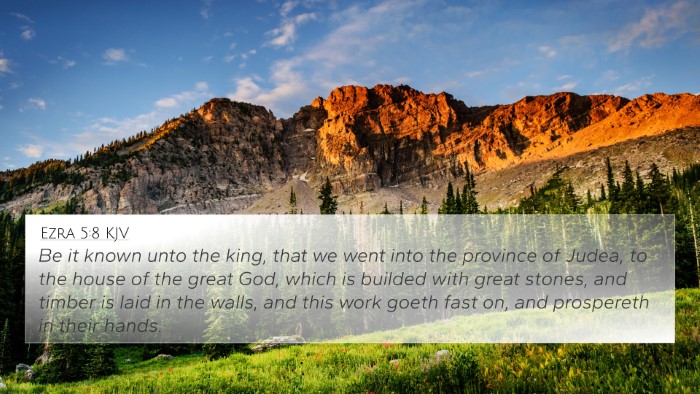
Ezra 5:8 (KJV) »
Be it known unto the king, that we went into the province of Judea, to the house of the great God, which is builded with great stones, and timber is laid in the walls, and this work goeth fast on, and prospereth in their hands.
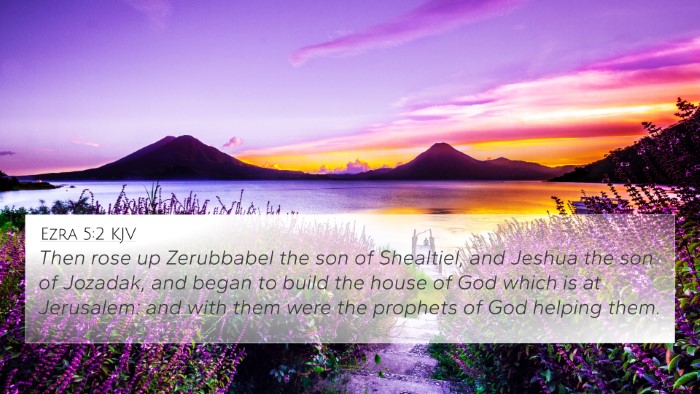
Ezra 5:2 (KJV) »
Then rose up Zerubbabel the son of Shealtiel, and Jeshua the son of Jozadak, and began to build the house of God which is at Jerusalem: and with them were the prophets of God helping them.
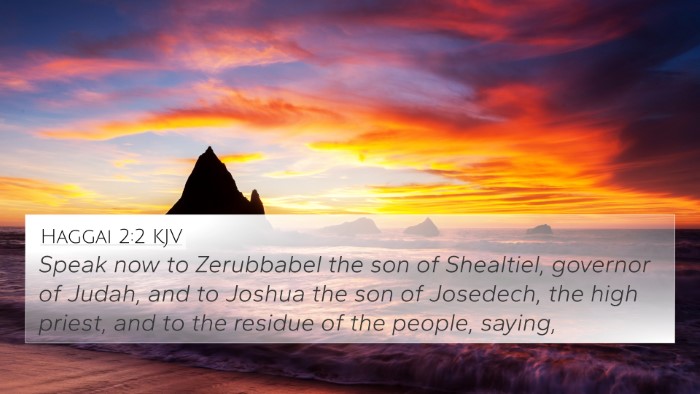
Haggai 2:2 (KJV) »
Speak now to Zerubbabel the son of Shealtiel, governor of Judah, and to Joshua the son of Josedech, the high priest, and to the residue of the people, saying,
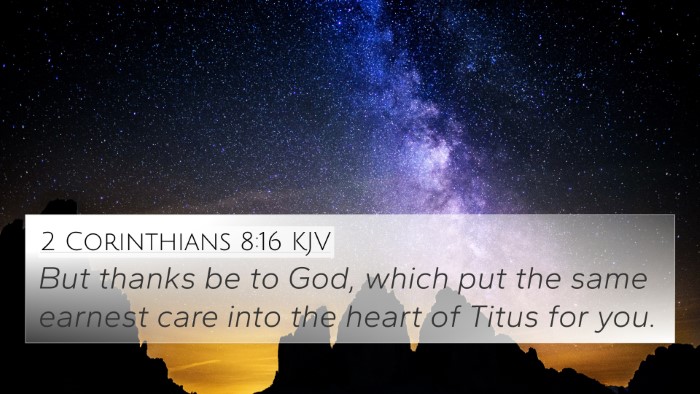
2 Corinthians 8:16 (KJV) »
But thanks be to God, which put the same earnest care into the heart of Titus for you.
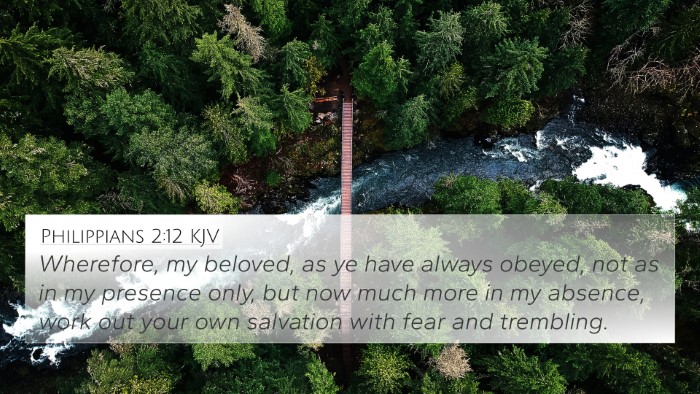
Philippians 2:12 (KJV) »
Wherefore, my beloved, as ye have always obeyed, not as in my presence only, but now much more in my absence, work out your own salvation with fear and trembling.
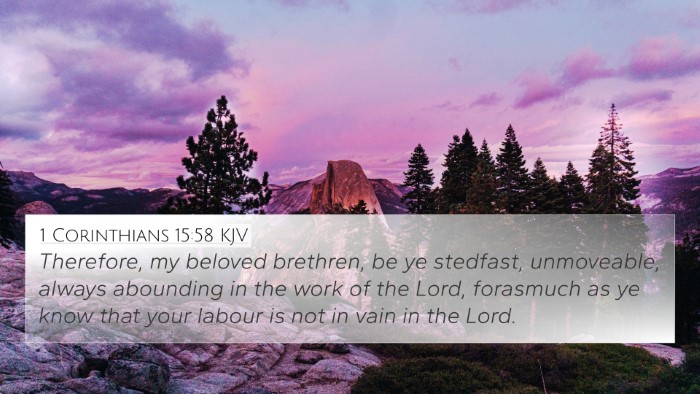
1 Corinthians 15:58 (KJV) »
Therefore, my beloved brethren, be ye stedfast, unmoveable, always abounding in the work of the Lord, forasmuch as ye know that your labour is not in vain in the Lord.
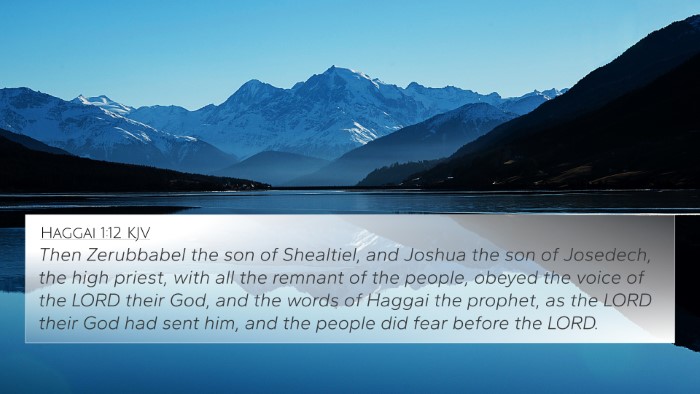
Haggai 1:12 (KJV) »
Then Zerubbabel the son of Shealtiel, and Joshua the son of Josedech, the high priest, with all the remnant of the people, obeyed the voice of the LORD their God, and the words of Haggai the prophet, as the LORD their God had sent him, and the people did fear before the LORD.
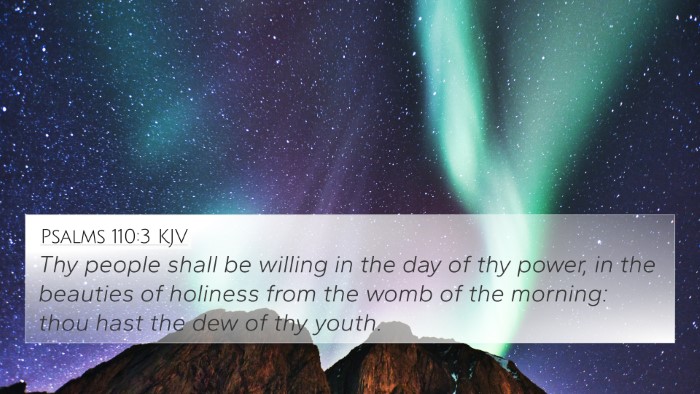
Psalms 110:3 (KJV) »
Thy people shall be willing in the day of thy power, in the beauties of holiness from the womb of the morning: thou hast the dew of thy youth.
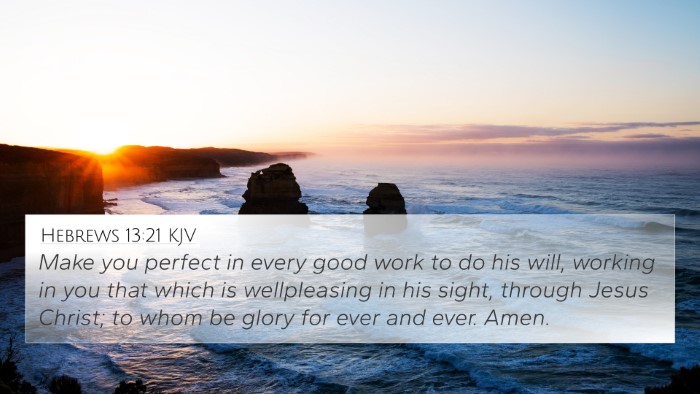
Hebrews 13:21 (KJV) »
Make you perfect in every good work to do his will, working in you that which is wellpleasing in his sight, through Jesus Christ; to whom be glory for ever and ever. Amen.
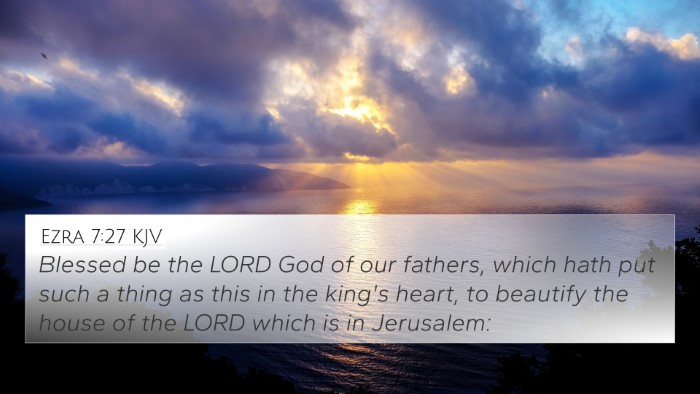
Ezra 7:27 (KJV) »
Blessed be the LORD God of our fathers, which hath put such a thing as this in the king's heart, to beautify the house of the LORD which is in Jerusalem:
Haggai 1:14 Verse Analysis and Similar Verses
Understanding Haggai 1:14
Bible Verse: Haggai 1:14
Haggai 1:14 states, "And the LORD stirred up the spirit of Zerubbabel the son of Shealtiel, governor of Judah, and the spirit of Joshua the son of Jehozadak, the high priest, and the spirit of all the remnant of the people; and they came and did work in the house of the LORD of hosts, their God."
Summary of Haggai 1:14
This verse highlights God's empowerment over key figures and the remnant of His people as they begin to rebuild the temple. It signifies divine initiative and human response in the restoration process.
Commentary Insights
-
Matthew Henry:
Henry emphasizes the sovereign will of God in stirring the hearts of His leaders and the people. The phrase "stirred up" suggests an awakening or renewed zeal, indicating that God's presence is what motivates the people to act. He also notes that Zerubbabel and Joshua represent both civil and religious authority, showing the cooperation necessary for reconstruction.
-
Albert Barnes:
Barnes comments on the significant role of the leaders' spirits being stirred. He points out that God's influence extends not just to leadership but also to the common people, illustrating a collective movement towards fulfilling God's will. The mention of "remnant of the people" signifies a faithful group in contrast to the larger community that had strayed, reaffirming God's ability to work through a small, committed remnant.
-
Adam Clarke:
Clarke notes that the Lord's stirring of spirit is a common theme throughout scripture, relating it to times when individuals were led to accomplish significant tasks. He highlights the importance of divine inspiration for fulfilling God's purpose, particularly in the context of building the temple as a symbol of God's dwelling among His people.
Thematic Connections
Haggai 1:14 connects with numerous themes within the biblical narrative, including:
- Divine Initiative: God actively engages and inspires His people to act.
- Restoration: The endeavor to rebuild the temple represents restoration both physically and spiritually.
- Leadership: The mention of Zerubbabel and Joshua emphasizes the importance of godly leadership in spiritual matters.
- Community Response: The action of the remnant highlights the necessary participation of the people in God's work.
Cross-References
Haggai 1:14 relates to several other scripture passages that enhance its understanding:
- Ezra 1:5: "Then the heads of the fathers' houses of Judah and Benjamin, and the priests and the Levites, with all whose spirits God had moved, arose to go up and build the house of the LORD which is in Jerusalem." - This shows a parallel calling to rebuild the temple.
- Philippians 2:13: "For it is God who works in you both to will and to do for His good pleasure." - This reflects the same theme of divine action stirring up human response.
- Zechariah 4:6: "So he answered and said to me: 'This is the word of the LORD to Zerubbabel: Not by might nor by power, but by My Spirit,' Says the LORD of hosts." - Reinforcing that success is due to God's Spirit, not human strength.
- Nehemiah 2:18: "And I told them of the hand of my God which had been good upon me; and also of the king's words that he had spoken to me. So they said, 'Let us rise up and build.' Then they set their hands to this good work." - Another instance of a similar divine impetus stirring the people.
- 1 Corinthians 12:7: "But the manifestation of the Spirit is given to each one for the profit of all." - Emphasizes the role of the Spirit in equipping the community for collective action.
- Acts 2:17: "‘And it shall come to pass in the last days,’ says God, ‘That I will pour out of My Spirit on all flesh; Your sons and your daughters shall prophesy, Your young men shall see visions, Your old men shall dream dreams." - God's Spirit empowering the people to fulfill His purposes.
- Isaiah 44:28: "Who says of Cyrus, ‘He is My shepherd, And he shall perform all My pleasure,’ Saying to Jerusalem, ‘You shall be built,’ and to the temple, ‘Your foundation shall be laid.’" - Foreshadowing a restoration effort led by a divinely chosen leader.
Practical Applications
Understanding Haggai 1:14 carries practical implications for believers today:
- Recognizing the need for divine assistance in personal and communal endeavors.
- Responding to God's call when prompted, similar to the leaders and people in Haggai's time.
- Cultivating a spirit of cooperation between leaders and the community in serving God.
- Engaging in spiritual restoration in our lives and communities.
Conclusion
Haggai 1:14 serves as a profound reminder of God's sovereign ability to inspire and mobilize His people towards fulfilling His purposes. Through the combined insights from renowned Bible commentators, it is evident that this verse encapsulates themes of divine action, communal engagement, and the importance of spiritual leadership in the restoration process. By exploring its connections with other scriptures, we see the broader biblical narrative's emphasis on God's faithful guidance and empowerment for His people.
